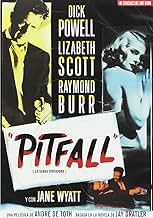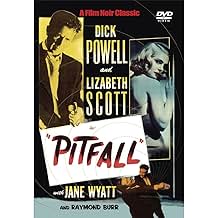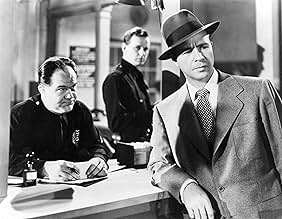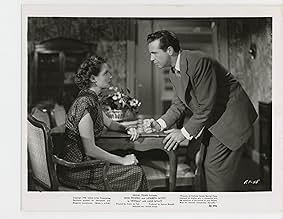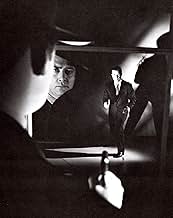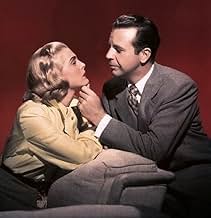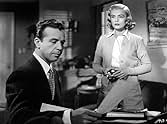NOTE IMDb
7,1/10
5 k
MA NOTE
John Forbes, expert en assurances, tombe amoureux de la femme fatale Mona Stevens alors que son petit ami est en prison, ce qui aura de graves conséquences pour tous.John Forbes, expert en assurances, tombe amoureux de la femme fatale Mona Stevens alors que son petit ami est en prison, ce qui aura de graves conséquences pour tous.John Forbes, expert en assurances, tombe amoureux de la femme fatale Mona Stevens alors que son petit ami est en prison, ce qui aura de graves conséquences pour tous.
- Réalisation
- Scénario
- Casting principal
- Récompenses
- 1 victoire au total
Dick Wessel
- Desk Sergeant
- (as Dick Wassel)
Eddie Borden
- Prison Visitor
- (non crédité)
Helen Dickson
- Fashion Show Attendee
- (non crédité)
Don Haggerty
- District Attorney's Man
- (non crédité)
Sam Harris
- Man in Diner
- (non crédité)
Thomas Martin
- Bartender
- (non crédité)
David McMahon
- Police Lieutenant
- (non crédité)
Avis à la une
Pitfall is about precisely that. Forty something insurance man Dick Powell is getting restless. He's seemingly achieved the American dream, wife, kid, nice home and car. And the nice wife is played by Jane Wyatt who was using this film to warm up for the queen of nice wives in the Fifties as Betty Anderson in Father Knows Best.
Powell is brought a report on a claim that one of the hired investigators Raymond Burr has. Byron Barr has embezzled money that Powell's insurance company is covering. Barr has spent the money lavishly on presents for Lizabeth Scott. Powell has to check this one out for himself. Of course he meets Lizabeth Scott and nature takes its course. Barr mean time is serving time in jail and Raymond Burr has decided to stake out Ms. Scott for himself. Or maybe the right word is stalk.
So we've got Barr serving, Burr stalking, Powell cheating, what's this Lizabeth Scott got to get all these guys hormones working in overdrive?
My description of Pitfall may have been flip up to now, but it really is a fine drama with no real heroes in it, except maybe Jane Wyatt. The best performance in Pitfall goes to Raymond Burr who is really a malevolent figure with his obsession about Scott.
Powell is brought a report on a claim that one of the hired investigators Raymond Burr has. Byron Barr has embezzled money that Powell's insurance company is covering. Barr has spent the money lavishly on presents for Lizabeth Scott. Powell has to check this one out for himself. Of course he meets Lizabeth Scott and nature takes its course. Barr mean time is serving time in jail and Raymond Burr has decided to stake out Ms. Scott for himself. Or maybe the right word is stalk.
So we've got Barr serving, Burr stalking, Powell cheating, what's this Lizabeth Scott got to get all these guys hormones working in overdrive?
My description of Pitfall may have been flip up to now, but it really is a fine drama with no real heroes in it, except maybe Jane Wyatt. The best performance in Pitfall goes to Raymond Burr who is really a malevolent figure with his obsession about Scott.
Andre De Toth's Pitfall opens in the shaky sanctuary of post-war domestic bliss. Jane Wyatt cracks eggs into a cast-iron skillet, to be served to her insurance-claims adjuster husband Dick Powell and their tousle-haired young son; the cozy breakfast nook where they exchange morning what-if banter looks out upon a vista of the New California of subdivisions and revolving credit and sunny possibilities yet to be realized. But, as Wyatt drives Powell into downtown Los Angeles (two-car families still being around the corner), he grouses absently about his routine job and clockwork schedule before giving her a perfunctory peck on the cheek. The canker has invaded the rose. As he later confesses, he feels he's in a rut `six feet deep,' and yearns for freedom adventure. He gets more than he bargained for.
Waiting for him in his office is `Gruesome,' private investigator Raymond Burr, who's done some legwork concerning a convicted felon who has defrauded the company. The felon (Byron Barr) squandered most of his ill-gained money showering his girlfriend (Lizabeth Scott) with furs, an engagement ring and even a little speedboat. Burr, in the course of his sleazy sleuthing, has taken quite an obsessive fancy to her, but Powell warns him off, saying he'll wrap the case up himself.
At first Scott dismisses Powell as just `a little man with a briefcase,' an assessment that tallies too well with his own worst self-image. But to no one's surprise, in this climate of Pacific air and marital dissatisfaction, he ends up taking his own fancy to her, one that turns out to be mutual. They tear around the harbor in her boat, then fritter away the rest of the afternoon in a dim cocktail lounge. He doesn't get back to hearth and home till the wee small hours.
One night when his son is awakened by nightmares, Powell lectures him: `Take only good pictures and have only good dreams.' It's a case of do what I say, not what I do. By veering off from the straight and narrow, Powell has set into motion a chain of baleful events. The vindictive Burr assaults him outside his garage. Scott discovers that Powell's been hiding his life as a married father. Ex-cop Burr starts visiting Barr in stir, sowing seeds of jealousy and plans for revenge. Events converge one dreadful night with an unplanned pair of killings that leave the quick, arguably, worse off than the dead....
Jay Dratler's script (from his own novel) shows a progressive streak in dealing with the short and unpredictable fuses of controlling, potentially violent males stalkers. The script also serves the assembled cast well. True, there's not much to be done with Wyatt, with her cap-sleeved house-dresses and finishing-school elocution, but she's more plausible than she would be two years later as a highly unlikely femme fatale in The Man Who Cheated Himself. Here, she's the distaff side of those male dictators, a wife whose ideals of suburban decorum are chiseled into cold marble (she's a faint forerunner of Joan Crawford's Harriet Craig).
But Powell gets to tap deeply into his key emotion, snappish discontent, and lets it deepen into something close to small-time tragedy. Scott, always an iconic presence but an actress with limits, finds a comfortable part as a bewildered and vulnerable victim of the men who come into her life, bidden and unbidden. Burr, billed fourth (after Wyatt!), possibly fares best. Much in demand in the late 40s as one of the creepiest heavies, he earned that demand by providing extra (and maybe unasked-for) dimensions to the thugs he played. Like the giant Fafner in Das Rheingold, he lets a bit of yearning, of desperation, show under all his intimidating bulk (and in sheer avoirdupois, it's one of his biggest roles).
De Toth, better remembered for his westerns and 3-D horror pix like House of Wax, made, in Pitfall, one of the more distinctive titles of the noir cycle. Not often mentioned in top-ten lists, even those of black-and-white crime films of the post-war era, it has the effrontery to situate deceit and duplicity and betrayal where it surely ought not to belong not in road houses or tenement flats but right at the heart of a storybook American family (it's one of the more subversive films of the era).. Yes, there are lapses, chief among which is a score that keeps trying to crack corny little jokes. But in the denouement far from unleashing a hideous storm of terror, De Toth opts for cold detachment he casts a chill that lingers still.
Waiting for him in his office is `Gruesome,' private investigator Raymond Burr, who's done some legwork concerning a convicted felon who has defrauded the company. The felon (Byron Barr) squandered most of his ill-gained money showering his girlfriend (Lizabeth Scott) with furs, an engagement ring and even a little speedboat. Burr, in the course of his sleazy sleuthing, has taken quite an obsessive fancy to her, but Powell warns him off, saying he'll wrap the case up himself.
At first Scott dismisses Powell as just `a little man with a briefcase,' an assessment that tallies too well with his own worst self-image. But to no one's surprise, in this climate of Pacific air and marital dissatisfaction, he ends up taking his own fancy to her, one that turns out to be mutual. They tear around the harbor in her boat, then fritter away the rest of the afternoon in a dim cocktail lounge. He doesn't get back to hearth and home till the wee small hours.
One night when his son is awakened by nightmares, Powell lectures him: `Take only good pictures and have only good dreams.' It's a case of do what I say, not what I do. By veering off from the straight and narrow, Powell has set into motion a chain of baleful events. The vindictive Burr assaults him outside his garage. Scott discovers that Powell's been hiding his life as a married father. Ex-cop Burr starts visiting Barr in stir, sowing seeds of jealousy and plans for revenge. Events converge one dreadful night with an unplanned pair of killings that leave the quick, arguably, worse off than the dead....
Jay Dratler's script (from his own novel) shows a progressive streak in dealing with the short and unpredictable fuses of controlling, potentially violent males stalkers. The script also serves the assembled cast well. True, there's not much to be done with Wyatt, with her cap-sleeved house-dresses and finishing-school elocution, but she's more plausible than she would be two years later as a highly unlikely femme fatale in The Man Who Cheated Himself. Here, she's the distaff side of those male dictators, a wife whose ideals of suburban decorum are chiseled into cold marble (she's a faint forerunner of Joan Crawford's Harriet Craig).
But Powell gets to tap deeply into his key emotion, snappish discontent, and lets it deepen into something close to small-time tragedy. Scott, always an iconic presence but an actress with limits, finds a comfortable part as a bewildered and vulnerable victim of the men who come into her life, bidden and unbidden. Burr, billed fourth (after Wyatt!), possibly fares best. Much in demand in the late 40s as one of the creepiest heavies, he earned that demand by providing extra (and maybe unasked-for) dimensions to the thugs he played. Like the giant Fafner in Das Rheingold, he lets a bit of yearning, of desperation, show under all his intimidating bulk (and in sheer avoirdupois, it's one of his biggest roles).
De Toth, better remembered for his westerns and 3-D horror pix like House of Wax, made, in Pitfall, one of the more distinctive titles of the noir cycle. Not often mentioned in top-ten lists, even those of black-and-white crime films of the post-war era, it has the effrontery to situate deceit and duplicity and betrayal where it surely ought not to belong not in road houses or tenement flats but right at the heart of a storybook American family (it's one of the more subversive films of the era).. Yes, there are lapses, chief among which is a score that keeps trying to crack corny little jokes. But in the denouement far from unleashing a hideous storm of terror, De Toth opts for cold detachment he casts a chill that lingers still.
This is an all-around great noir film, as well as a very chilling anticipation of the sterlingness of the coming 50's ethos of home and fidelity at any price. Dick Powell gives a great performance as a man so tired of life and full of malaise that he can hardly stumble through his days as an insurance adjuster and "loving" father . Raymond Burr is the antithesis of his later Perry Mason (or the good-hearted Paul Drake) as a creepy detective stalking the low-rent Lizabeth Scott. And Jane Wyatt is (unintentionally?) the scariest of them all as Powells' homemaking wife. (After her son has a nightmare, she blames his comic books - and takes them away to be burned!) Pitfall is a fine example of the type of noir film that explores not the criminal underworld but the hidden pain and loneliness of the "everyman".
a bit like cape fear problem with the film--the answer to the problem ISN'T that difficult
Dick Powell plays an insurance investigator named John Forbes. His life is very routine and he makes a point (perhaps too much of a point) of beginning the film complaining about how routine his life is. Soon, he meets a woman on a case, Mona Stevens (Lizabeth Scott) and they begin seeing each other--which is a problem since Forbes is married. However, before it goes very far, she breaks it off with him when she learns he's married.
This is not the end to it, though. An insane private investigator (Raymond Burr) is infatuated with Mona and MUST have her. And, when he follows her and sees her with Forbes, this maniac decides to threaten to expose Forbes unless she agrees to be his girl. When this doesn't work, he beats Forbes senseless. And, when that doesn't seem to work, he goes to Mona's old boyfriend and gets the man worked up--so worked up that the old boyfriend comes gunning for Forbes. What's next? See this dark little film to see.
So is this film worth seeing? Yes, though it's far from perfect. As far as the good goes, Raymond Burr is wonderful and is really in his element playing this creepy and sociopathic jerk. He was great in this sort of role and played it in several other films, such as "The Blue Gardenia". Also, the basic story idea is good. However, the film is flawed--seriously flawed. This is because the entire film is based on characters who repeatedly make stupid choices. Any semi-sane man would have told their wife about what had happened or at least they would have gone to the police after they were assaulted and threatened. Many times he COULD have stopped the threats, attacks and eventual catastrophe that occurs at the end--a weakness in an otherwise enjoyable little noir movie. On balance, the good does outweigh the bad.
Dick Powell plays an insurance investigator named John Forbes. His life is very routine and he makes a point (perhaps too much of a point) of beginning the film complaining about how routine his life is. Soon, he meets a woman on a case, Mona Stevens (Lizabeth Scott) and they begin seeing each other--which is a problem since Forbes is married. However, before it goes very far, she breaks it off with him when she learns he's married.
This is not the end to it, though. An insane private investigator (Raymond Burr) is infatuated with Mona and MUST have her. And, when he follows her and sees her with Forbes, this maniac decides to threaten to expose Forbes unless she agrees to be his girl. When this doesn't work, he beats Forbes senseless. And, when that doesn't seem to work, he goes to Mona's old boyfriend and gets the man worked up--so worked up that the old boyfriend comes gunning for Forbes. What's next? See this dark little film to see.
So is this film worth seeing? Yes, though it's far from perfect. As far as the good goes, Raymond Burr is wonderful and is really in his element playing this creepy and sociopathic jerk. He was great in this sort of role and played it in several other films, such as "The Blue Gardenia". Also, the basic story idea is good. However, the film is flawed--seriously flawed. This is because the entire film is based on characters who repeatedly make stupid choices. Any semi-sane man would have told their wife about what had happened or at least they would have gone to the police after they were assaulted and threatened. Many times he COULD have stopped the threats, attacks and eventual catastrophe that occurs at the end--a weakness in an otherwise enjoyable little noir movie. On balance, the good does outweigh the bad.
In Los Angeles, the insurance executive John Forbes (Dick Powell) is a family man bored with his routine suburban life with his wife Sue (Jane Wyatt) and their son Tommy (Jimmy Hunt). When a man called Bill Smiley (Byron Barr) is arrested for embezzlement, Forbes hires the private investigator J.B. MacDonald (Raymond Burr) to find where the money is. MacDonald discovers that Smiley spent part of the money giving gifts to his girlfriend Mona Stevens (Lizabeth Scott) and becomes obsessed with her. Forbes goes to Mona's apartment to collect the gifts and he does not tell that he is married. Soon they have a brief love affair until Mona learns that his married with child. Meanwhile MacDonald unsuccessfully tries to seduce Mona that becomes friend of Forbes. When Smiley is near to be released, MacDonald poisons him against Forbes and on the day that Smiley is discharge, he gives a gun to him. What will happen to Forbes and Smiley?
"Pitfall" is a magnificent film-noir with a realistic story and well- developed characters. The direction and performances are top-notch and the cast gives credibility to the plot with excellent lines. Dick Powell and Jane Wyatt perform a mature couple that expects to supersede their problem. The gorgeous and sexy Lizabeth Scott is perfect in the role of a seductive femme-fatale. But Raymond Burr steals the show in the role of a despicable and Machiavellian villain. The open end is another plus in this great film. My vote is eight.
Title (Brazil): "Caminho da Tentação" ("Way to Temptation")
"Pitfall" is a magnificent film-noir with a realistic story and well- developed characters. The direction and performances are top-notch and the cast gives credibility to the plot with excellent lines. Dick Powell and Jane Wyatt perform a mature couple that expects to supersede their problem. The gorgeous and sexy Lizabeth Scott is perfect in the role of a seductive femme-fatale. But Raymond Burr steals the show in the role of a despicable and Machiavellian villain. The open end is another plus in this great film. My vote is eight.
Title (Brazil): "Caminho da Tentação" ("Way to Temptation")
Le saviez-vous
- AnecdotesThis was independently produced by Regal Films and released through United Artists. For decades, the film was rarely seen. It can be seen today through the preservation efforts of the UCLA Film and Television Archives.
- GaffesThe public elevator indicator in the Los Angeles Hall of Justice building shows floors 1 to 19. However, in reality, the building is only 14 stories tall.
- Citations
Tommy Forbes: Dad was a boxer in college!
Doctor: I think he was wise to go into insurance.
Doctor: [handing a prescription to Sue Forbes] Take this up to the drug store.
Sue Forbes: What is it?
Doctor: A course in boxing.
- ConnexionsFeatured in Noir Alley: Pitfall (2018)
Meilleurs choix
Connectez-vous pour évaluer et suivre la liste de favoris afin de recevoir des recommandations personnalisées
Détails
- Date de sortie
- Pays d’origine
- Langues
- Aussi connu sous le nom de
- Sanglante aventure
- Lieux de tournage
- 5424 Bradna Drive, Los Angeles, Californie, États-Unis(Forbes Family Home)
- Société de production
- Voir plus de crédits d'entreprise sur IMDbPro
Box-office
- Budget
- 1 000 000 $US (estimé)
- Durée1 heure 26 minutes
- Couleur
- Rapport de forme
- 1.37 : 1
Contribuer à cette page
Suggérer une modification ou ajouter du contenu manquant


